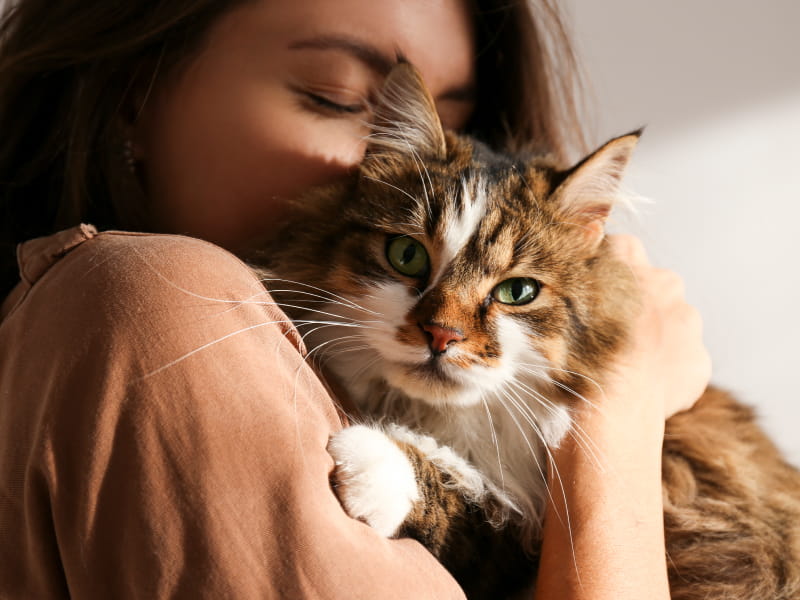Want your cat to stay in purrrfect health? Watch out for heart disease
By Tate Gunnerson, American Heart Association News

As evidenced by the countless adoring posts, cute videos and laugh-out-loud memes on social media, people love their furry feline friends. But keeping cats happy and healthy isn't always easy.
Indeed, cats suffer many of the same health problems humans do, including heart disease.
"We can roughly break down cat heart diseases into birth defects and acquired heart defects that they develop during life," said Dr. John Bonagura, a cardiologist and member of the department of clinical sciences at North Carolina State University College of Veterinary Medicine.
Congenital conditions include septal defects, or holes in the heart, malformed heart valves and blood vessel abnormalities. Heart disease in older cats can be related to thyroid disease or high blood pressure.
However, the vast majority of heart diseases in cats are caused by cardiomyopathies, which are heart muscle disorders that make it harder for the heart to effectively pump blood. These conditions can cause heart failure or sudden death, even in younger animals, and are more common in male cats.
Maine Coon and Ragdoll cats are among breeds prone to inherited cardiomyopathies, but any breed can develop a similar condition. The most common cardiomyopathy, called hypertrophic cardiomyopathy, causes thickening of the heart's left ventricle.
Cats with hypertrophic cardiomyopathy are at greater risk for fast or irregular heartbeats, heart failure that causes breathing difficulties, and blood clots. A clot in the legs can cause problems walking or even paralysis, while a clot in the heart can cause a heart attack.
"They don't have the atherosclerosis that we do," said Dr. Mark D. Kittleson, a professor emeritus at the School of Veterinary Medicine at the University of California, Davis.
According to Kittleson, most cats with cardiomyopathies don't have obvious symptoms. But if your cat is breathing faster or struggling to catch its breath, take it to the vet.
"Cats love to hide their clinical signs until they are in dire straits and then they tip over the edge," he said. "One second they are fine, and the next second, it's awful. It's an acute, devastating situation."
There are a limited number of genetic tests to screen Maine Coon and Ragdoll cats for cardiomyopathies. In other breeds, veterinarians use an echocardiogram, which creates an image of the heart using sound waves, to make a definitive diagnosis.
People with hypertrophic cardiomyopathy sometimes require open-heart surgery or heart transplants, but that's currently not possible in cats, which are too small to be hooked up to a heart-lung machine.
The good news is some of the medications that people take for heart problems also work in cats. For example, drugs that prevent clotting, such as aspirin or clopidogrel often are prescribed to cats with cardiomyopathies. And just as in humans, a common treatment for heart failure is a diuretic.
There also is medication to prevent heartworms, a potentially life-threatening condition for which there is no specific cure.
"Even two or three worms, which is the average number in cats, can be lethal," Bonagura said. "Being indoors doesn't really protect them, so people who live in areas where heartworm is prevalent should have their cats on preventative medicine as well."
As many cat owners know all too well, getting a kitty to take its meds isn't always easy. Bonagura recommended cutting the pills into pieces, putting them into a clear gel cap and coating it with a little butter.
"Cats are very taste and smell adverse, so if they bite into something bitter, they may be very hard to treat," Bonagura said. "Teach them to gradually accept things and give them rewards."
Other potential treatments for cats with heart problems include oxygen therapy, a low-sodium diet, a specific veterinary drug that can improve heart function called pimobendan, and procedures to remove extra fluid from the chest or abdomen.
While it can be scary when your cat has heart disease and some cases are severe, Bonagura said the right treatment and home care will increase the odds they will live a longer and happy life.
"Cats are pretty tough," he added. "They almost do have nine lives."
If you have questions or comments about this story, please email [email protected].





